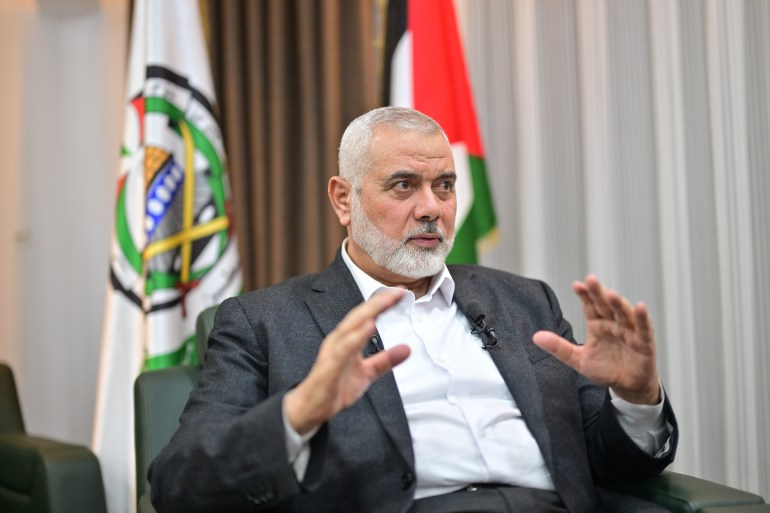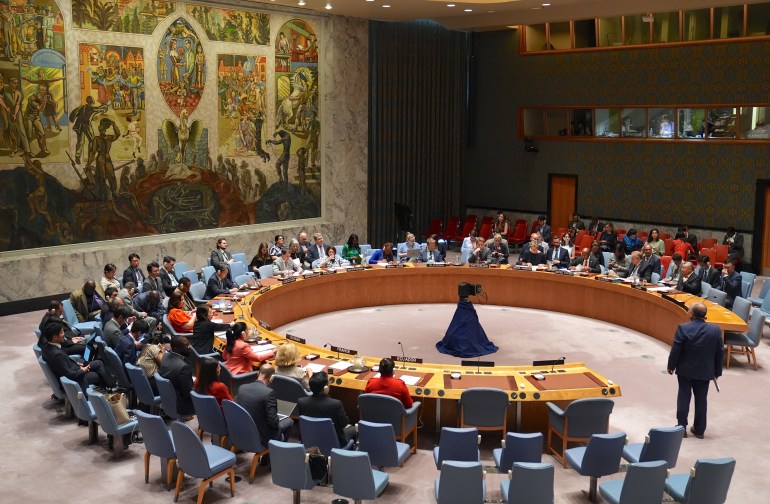Security Council holds emergency session after Haniyeh's assassination | News
1/8/2024–|Last update: 1/8/202405:19 AM (Makkah Time)
The UN Security Council held an emergency session at Iran's request and with the support of Russia, China and Algeria, hours after Israel assassinated Hamas political bureau chief Ismail Haniyeh in Tehran.
Several council members expressed concern during their session on Wednesday about the risks of the conflict in the Middle East expanding after Israel's assassination of Ismail Haniyeh in Tehran.
Iran's UN Security Council representative, Amir Saeed Iravani, condemned what he described as the Israeli terrorist act of assassinating Haniyeh. The Iranian representative said that the UN Security Council should “take immediate steps to hold Israel accountable for this aggressive act, including considering sanctions…”
The spokesman accused the United States of involvement in helping Israel in the assassination of Haniyeh and said, “Israel would not have committed this crime without intelligence support from the United States.”
Haniyeh was assassinated early Wednesday in Tehran in an Israeli airstrike on his residence. Hamas and Iran vowed revenge for his death, raising particular concerns in the United States about the expansion of the conflict in the region amid the Israeli war on Gaza and the months-long confrontations across the Lebanese border between Hezbollah and Israel.

Condemnations
Several Council members, including China, Russia and Algeria, expressed their clear condemnation of Haniyeh's assassination.
The Algerian ambassador said, “Israel has pursued a policy of bloodshed and scorched earth that leaves behind destruction and an endless wave of violence sweeping through Gaza, the West Bank, Yemen, Lebanon and now Iran.”
“Where will this madness stop?” he added, accusing Israel of sabotaging peace efforts in the Middle East.
The Russian representative to the Security Council said that the assassination of Haniyeh constitutes a strong blow to mediation and negotiations.
He stressed that those behind the political assassinations must realize the seriousness of the consequences for the region, considering that there are attempts to drag Iran into a regional confrontation in light of the already boiling atmosphere.

UN warning
Before the council convened, UN Secretary-General Antonio Guterres expressed his concern over the two assassinations that took place within hours of each other in Beirut and Tehran, the first of which claimed the life of Hezbollah military leader Fouad Shukr and the second of which claimed the life of Haniyeh.
Guterres warned that what happened in Tehran and before that in the southern suburbs of Beirut “represents a dangerous escalation.”
During the Security Council session, Robert Wood, the US Deputy Ambassador to the United Nations, said that “it is best not to speculate about the impact of recent events on peace and security in the Middle East, as the outbreak of a wider war is neither imminent nor inevitable,” according to his expression.
As for Jonathan Miller, the Israeli deputy ambassador, he ignored commenting on the assassination of Haniyeh in Iran, and was content to talk about the raid that targeted Hezbollah leader Fouad Shukr.
Miller said in his speech during the emergency session of the Security Council regarding the assassination of Haniyeh, “Those who want stability in the region should welcome the removal of terrorists, not call for restraint,” as he put it.
For her part, the Deputy Palestinian Representative to the United Nations said that the Security Council had failed to do its duty in working to impose a ceasefire in Gaza.
The representative added in a speech before the Security Council that Israel is allowed to wage this war in broad daylight without any restrictions or consequences. She considered that the failure to hold Israel accountable has allowed it to commit these crimes and continue them.
